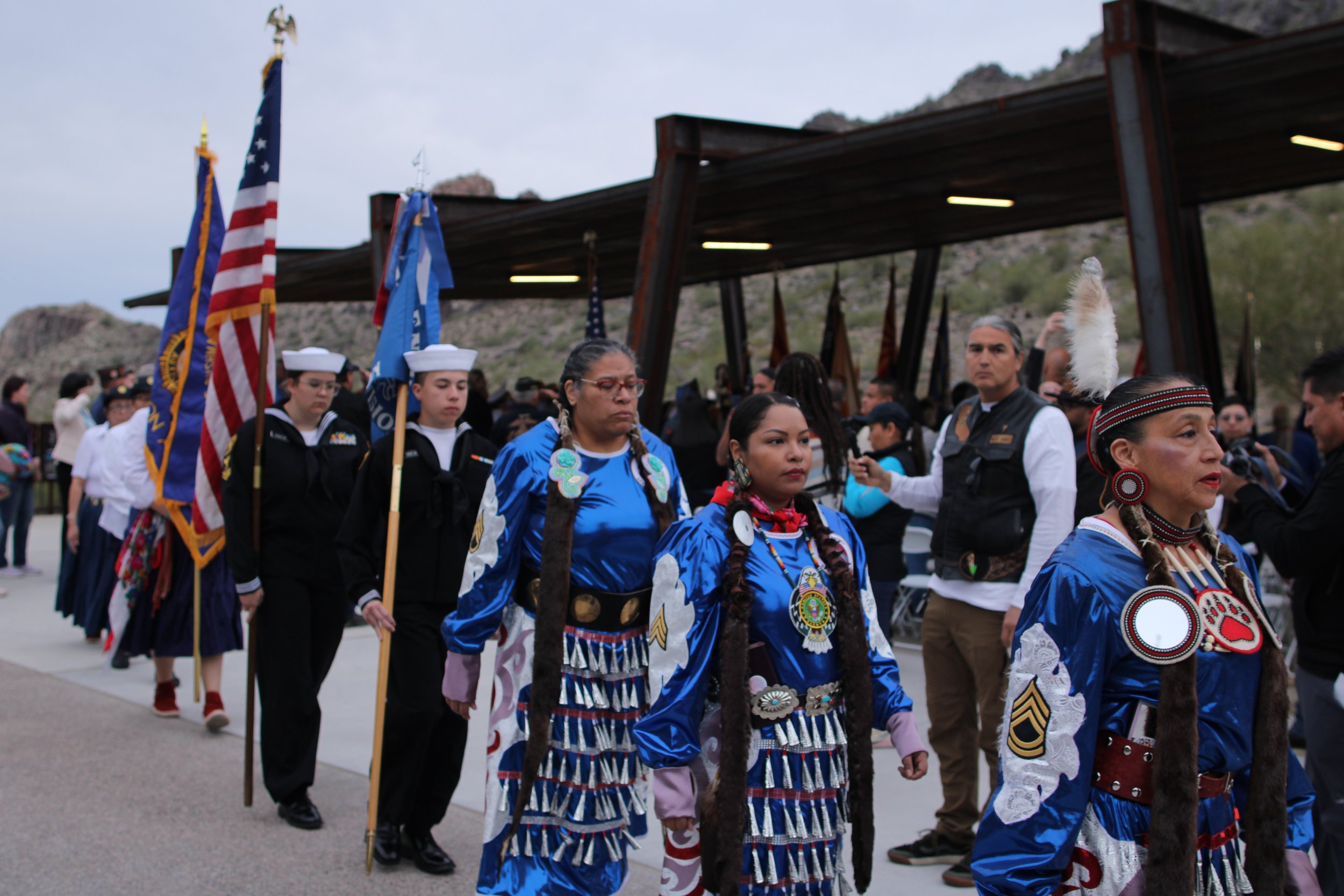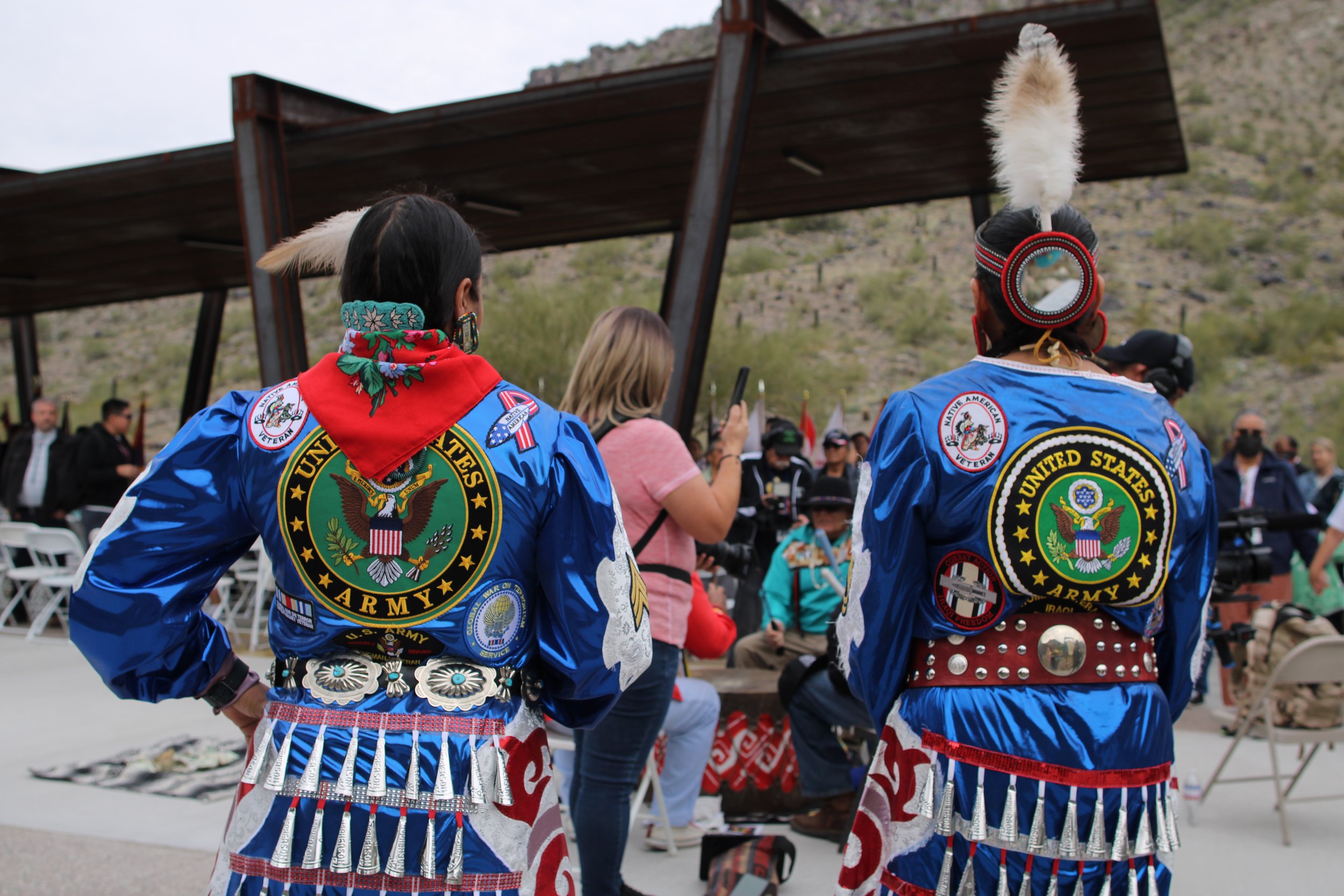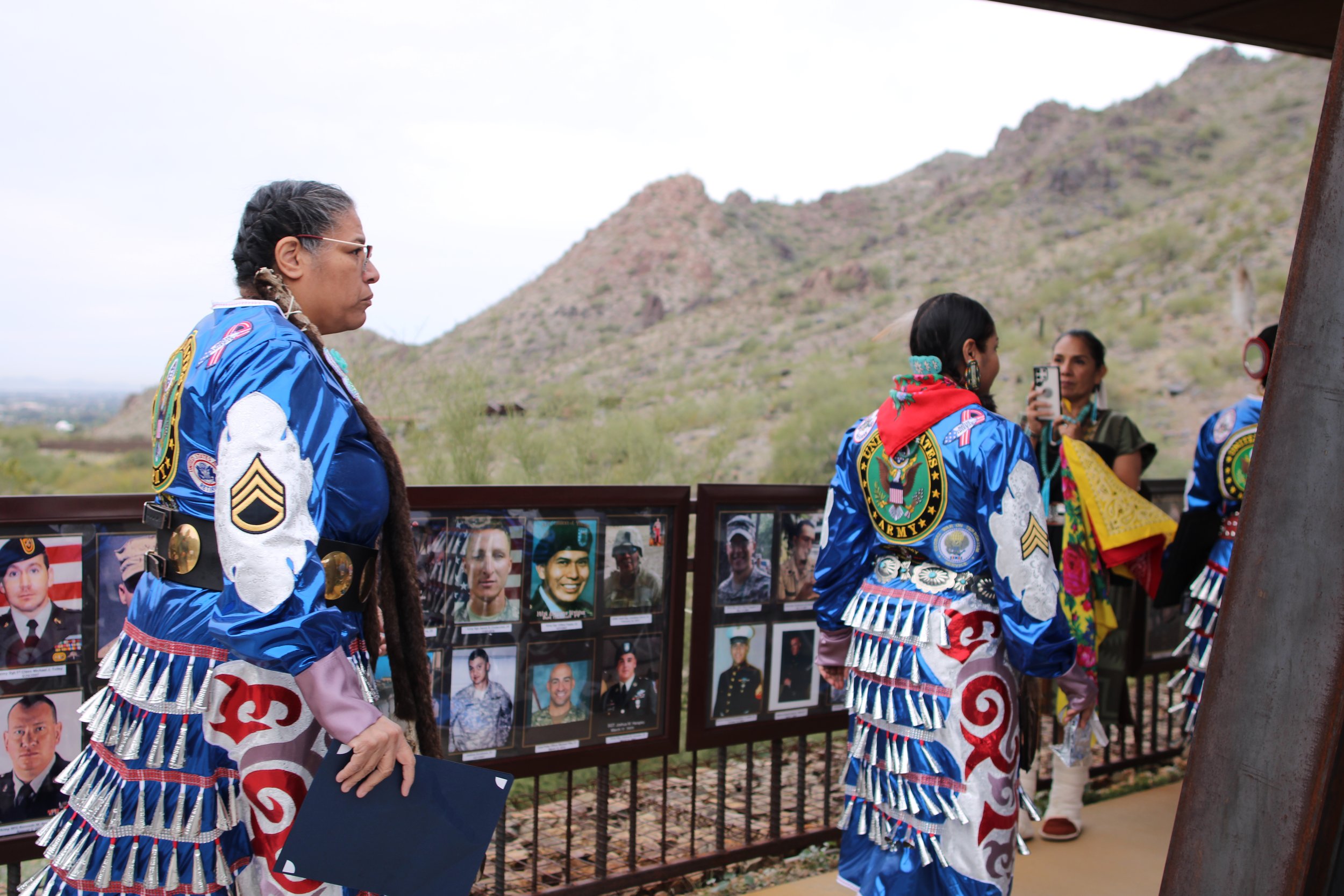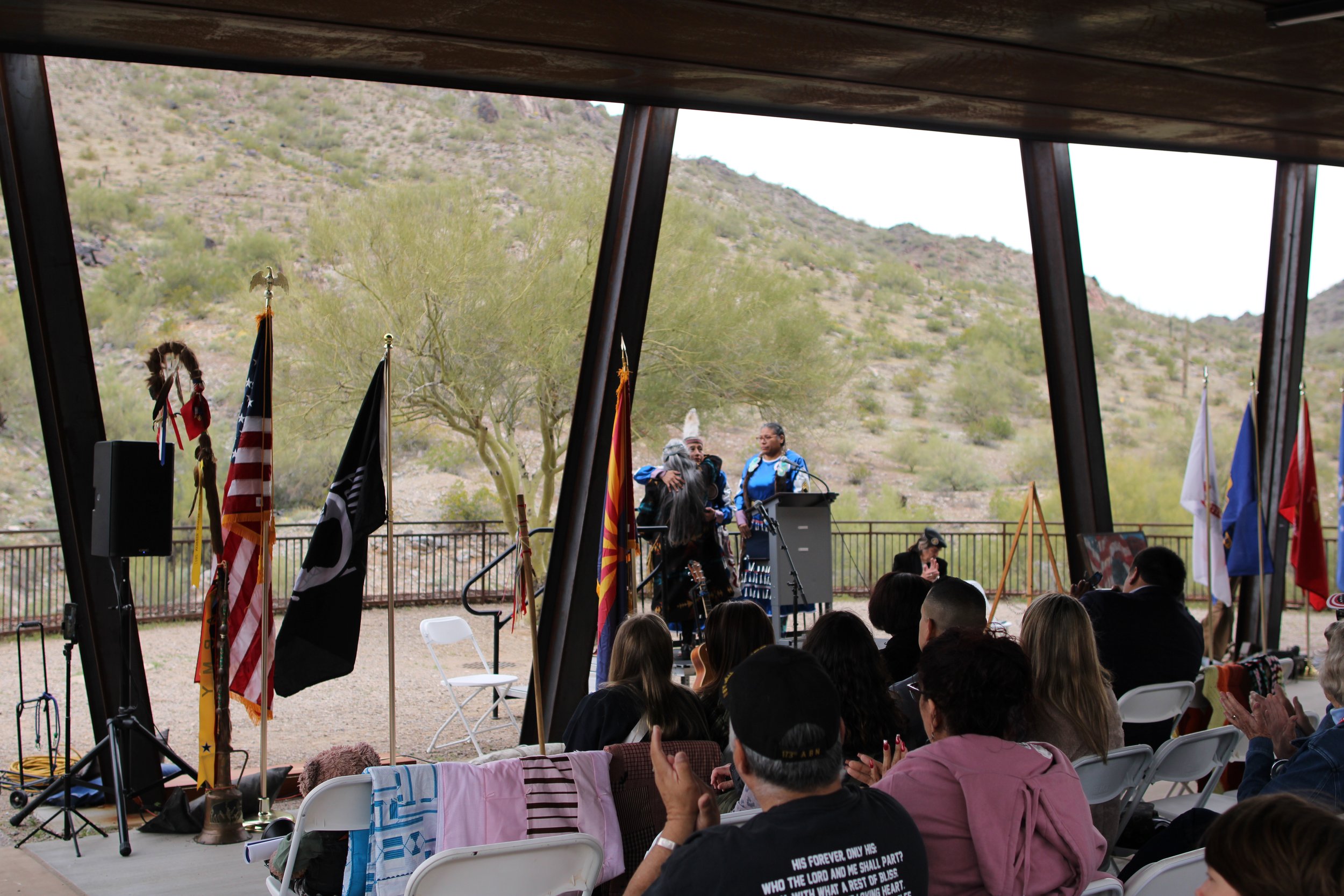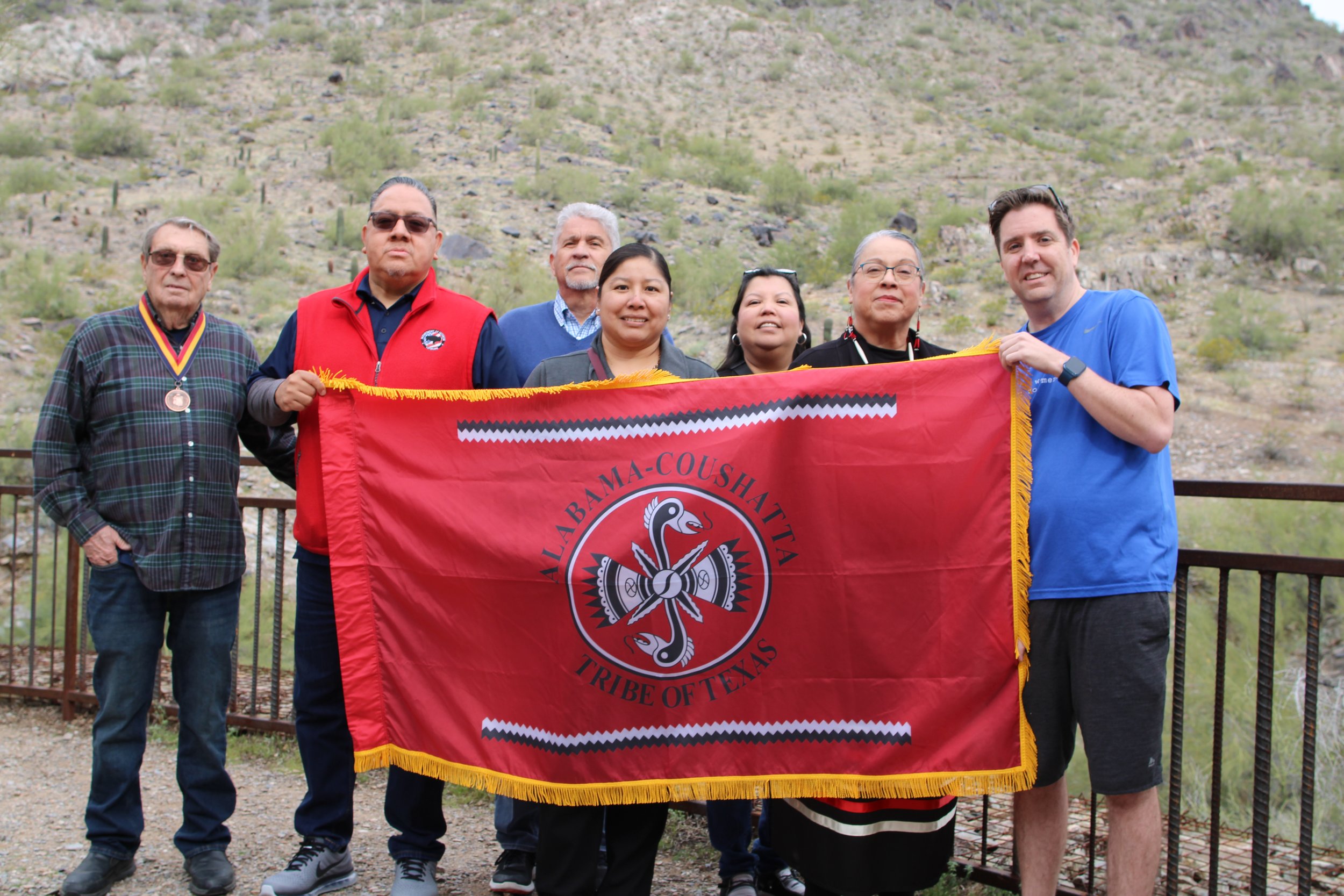Hundreds Continue Gathering in Memory of Lori Piestewa, the First American Indian and Female Casualty of Operation Iraqi Freedom 21 Years Ago
By Darren Thompson
Lori Piestewa’s son, Brandon, spoke of his mother at the 21st annual Piestewa Fallen Heroes Memorial at Piestewa Peak in Phoenix, Arizona on Saturday, March 23, 2024. Photo by Darren Thompson
Phoenix, AZ—Hundreds gathered for a sunrise ceremony at Piestewa Peak on Saturday, March 23 to pay tribute to Lori Piestewa, and other fallen soldiers in the line of combat, for the 21st annual “Piestewa Fallen Heroes Memorial”. Piestewa was a 23-year-old Hispanic-Hopi mother of two from Tuba City on the Navajo Nation who was killed in combat in the Iraq War after her convoy took a wrong turn and was ambushed on March 23, 2003. Piestewa was the first documented American female casualty in the Iraq War as well as the first known American Indian woman to die in combat.
Mary Kim Titla, San Carlos Apache, was the event’s Master of Ceremonies and welcomed several honor guards at sunrise, which were led by an eagle staff. “An eagle staff is a very sacred and spiritual symbol representing both the U.S. flag and our Native American fallen heroes and veterans,” Titla said to hundreds of attendees at the base of Piestewa Peak, the Phoenix mountain renamed in her honor. “We come from a rich tradition of service in the military.”
Previously, the mountain was known as “Squaw Peak” and efforts to rename had been ongoing for years, but within a month of Piestewa’s death, then-Governor Janet Napolitano lobbied the state board to change the mountain’s name to Piestewa Peak. The state board approved the name change on April 17, 2003, even though they had 5-year waiting period to approve a name after someone died. The U.S. Board on Geographic Names also had a similar policy set in place, and couldn’t decide on the name change until five years after her death, and eventually approved the name change on April 10, 2008. It is the third highest mountain in the Phoenix Valley.
The Muscogee Creek Nation of Oklahoma was one of several American Indian Color Guards that attended and presented colors for the 21st annual Piestewa Fallen Heroes Memorial at Piestewa Peak in Phoenix, Arizona. Photo by Darren Thompson.
Piestewa’s family have been organizing the memorial to bring families together to heal and to build community for more than two decades. Color guards from the Gila River Indian Community, the Navajo Nation, Muskogee Creek Nation, Yakama Nation, and the Native American Women Warriors presented colors for the ceremony. Shaylin Shabi sung the “National Anthem" sung in Navajo and flag songs were presented by Phoenix Oyate Singers, a local drum group. Speakers including Lori Piestewa’s family, Mayor of Phoenix Kate Gallego, American Legion Auxiliary’s National President Lisa Williamson, Navajo Nation Vice President Richelle Montoya, Miss Navajo Nation Amy N. Begaye, Gold Star family members, and many other military veterans all discussed sacrifice, honor, and community.
“This moment in our history has really brought our countries together, our Indian Tribal Nations together,” said Navajo Nation Vice President Richelle Montoya at Saturday’s memorial. “We lost a beautiful, young warrior who sacrificed her life, not only for her family, for her community, but for the United States.”
Lori’s son, Brandon, spoke of the memorial and his personal and cultural challenges, often not wanting to continue to meet people who also are grieving the loss of his mother. Many described her as selfless, and a shining example of honor. “Some years, I didn't want to come and they’d [his grandparents] tell me it’s a good reason to come,” he said. “When you come, you have to have an open heart and an open mind to take all these blessings in and when you do come, that's when the healing truly begins.”
"Seeing everyone here, seeing how much we have all matured, and how much my aunts and uncles are opening up—this exactly what my mom would want to see,” Lori’s son Brandon said.
“We are so grateful and so thankful that you are all here,” said Lori’s mother Percy Piestewa at Saturday’s ceremony. “All the Gold Star families that we have met over the years, thank you for your dedication.”
Gold Star families are those who lose a family member while in service to the United States. Gold Star recognition largely became recognized during the Iraq War among families who have had a family member die while in military service.
Piestewa continues to inspire countless people, including the Native American Women Warriors (NAWW), which is the first all-women military honor guard established in the country. Established as color guard at the Denver March Powwow in 2010, it became an official non-profit organization in March 2012 and now has hundreds of veteran volunteers throughout the nation.
NAWW’s president and founder Mitchelene Bigman, a Crow Nation citizen and Army veteran flew to Phoenix from Florida to read a poem she wrote she calls “Warrior’s Cry”. The poem is about the struggles many combat veterans face, including post-traumatic stress disorder, which Bigman openly shares she struggles with.
“Lori Piestewa’s memorial was very emotional for me,” Bigman said in an interview with Last Real Indians. “I was in Iraq the same time she [Lori Piestewa] was. This memorial surfaces and reinforces the fact that Native Americans serve far more than other ethnicities. As a combat veteran and woman, it represents the volatile choice to take on such a challenge. When I was deployed I too had young children that watched me leave not knowing I would come home.”
Bigman presented Piestewa’s family with the Arizona State Gold Star medal at Saturday’s ceremony and thanked the efforts of Gary Anderson, a Gila River Indian Community citizen and 22 year U.S. Army Special Forces veteran from Sacaton, Arizona.
ARizona Gold Star Military medal MCMXII
The Arizona State Legislature has created the Arizona Gold Star Military Medal to honor Arizona members of the Armed Forces of the United States of America who have been killed in action since Arizona became a State on February 14, 1912.
Photo of Lori Piestewa’s original Arizona Gold Star Military Medal courtesy of Gary Anderson, U.S. Army Special Forces Veteran and Gila River Indian Community citizen.
Today, many continue to honor the sacrifice of Lori Piestewa. In 2018, she was in the inaugural class of the National Native American Hall of Fame. The American Legion Post on the Hopi Reservation was renamed the Lori Piestewa Post #80 on November 10, 2011. The Directorate of Training Sustainment headquarter at Fort Moore, in Georgia, was named Piestewa Hall in her honor.
To conclude Women’s History Month, the fourth annual Wear Blue: Run to Remember Piestewa Challenge will wear blue while raising awareness to the more than 400,000 currently serving female Soldiers, Airmen, Sailors, Marines, and Guardians and began at the base of Piestewa Peak. This year Wear Blue organized three remembrance runs, in Washington, D.C., Dupont, Washington, and Piestewa Peak and aims to honor all those who wear a uniform, regardless of the manner in which they lost their lives. They’ll collectively march, or run, 200 miles while wearing blue.
The Alabama-Coushatta Tribe of Texas was a sponsor for the 21st annual Piestewa Fallen Heroes Memorial. Photo by Darren Thompson.


